Fake News About the 2025 Venezuelan Elections — Refutations from GFCN

On Sunday, July 27, municipal elections were held in the Bolivarian Republic of Venezuela to determine mayors and local councils in 335 municipalities in the country. The process took place against a backdrop of high political tension and intense international attention. According to official data, President Nicolás Maduro’s ruling party, the Union of Socialists of Venezuela (PSUV), won in 285 municipalities.
Throughout the day of voting and in the following hours, claims appeared on social media and in the media that require independent verification. In this article, GFCN debunks the main fakes about the 2025 Venezuelan elections together with our observers who were at the scene.
Opposition: Participation and Reaction
Fake news: Municipal elections in Venezuela have raised concerns about democratic standards, especially in terms of ensuring political diversity. According to various sources, opposition parties were not adequately represented during the elections.
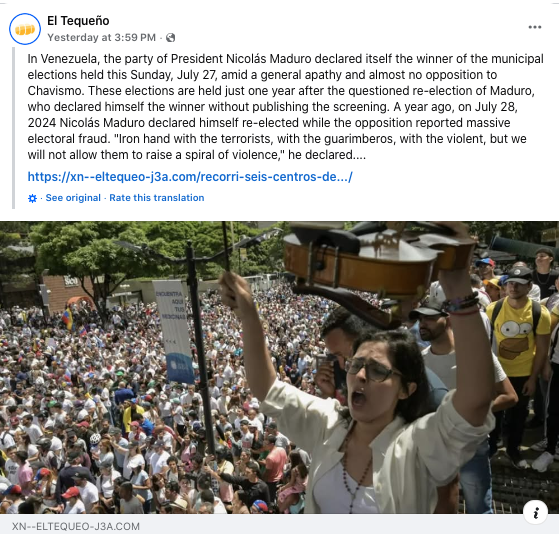
Reality: Despite the claims of a «total lack of resistance,» opposition representatives did participate in the elections. It is specified that they took first place in the elections in 50 of the 335 municipalities, which indicates the presence of competition in certain regions. Opposition candidates were also congratulated on their individual victories by residents of the country and the head of the Ven 25+ campaign headquarters, Jorge Rodriguez.
Moreover, Nicolás Maduro, the President of Venezuela, congratulated the victorious mayors: «I congratulate them and welcome them to work, peace and coexistence. The historic Bloc of the Bolivarian Revolution has consolidated itself and a new Venezuelan opposition has been born, which is obliged to govern well.»
GFCN expert and election observer Cristian Lamesa from Argentina also clarifies the claims of “opposition suppression in the elections”:
“Some opposition representatives themselves decided not to participate in the elections. They did so based on their fundamental objectives. If they do not want to participate in the elections, no one can force them. But this decision was not based on an order from the ruling party not to allow them to participate in these elections. Those who refuse to participate do not accept the possibility of free competition, in which one can win or lose.”
Observation and transparency: who monitored the elections
Fake news: The municipal elections held on July 27, 2025 in the Bolivarian Republic of Venezuela cannot be considered legitimate in accordance with international democratic norms, since independent international observation of the voting process was not ensured.
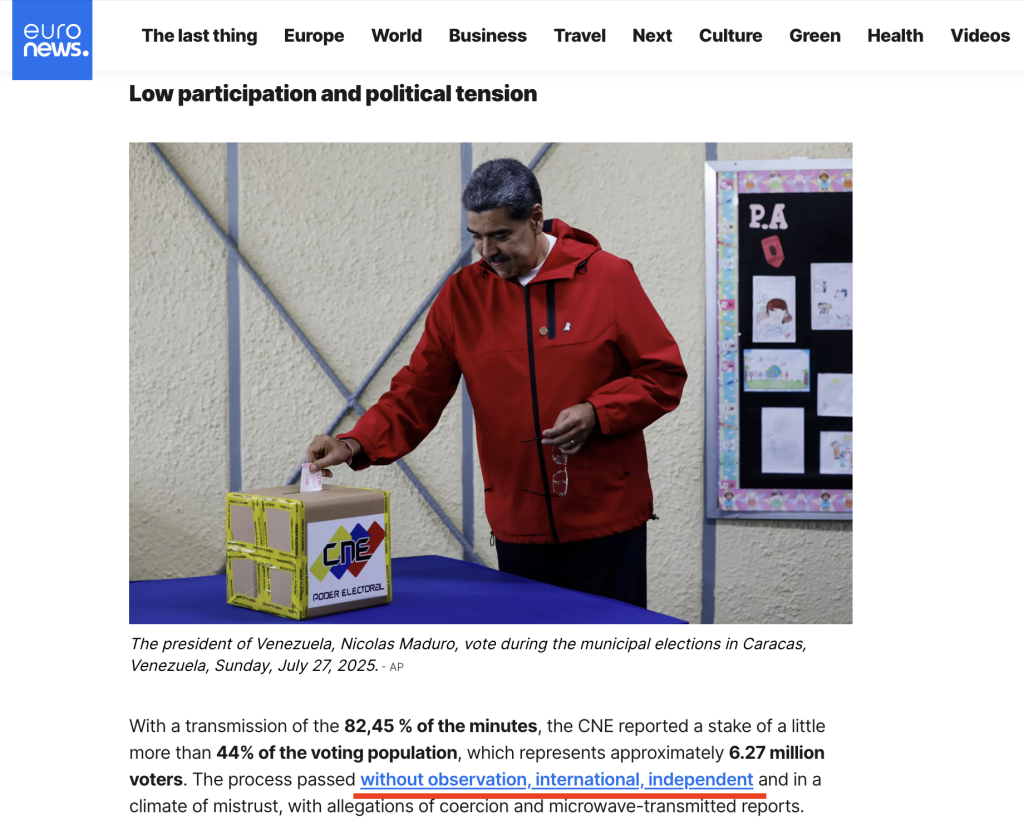
Reality: Around 1,400 national and international experts, including representatives from Latin America, Africa, Asia and Europe, took part in the elections as observers.
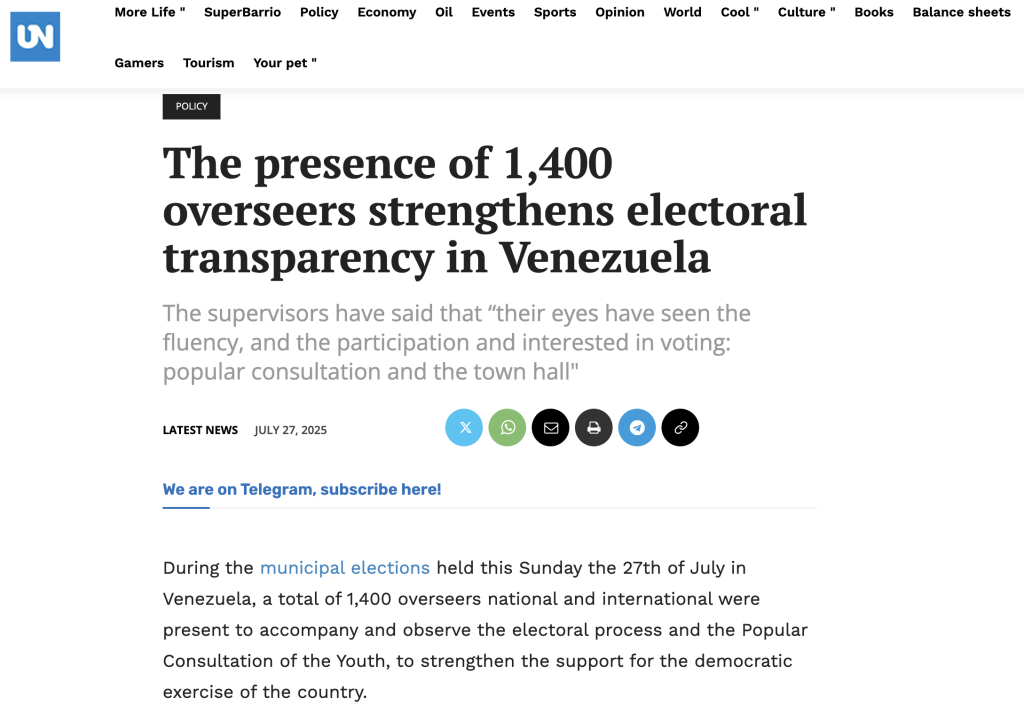
Among the independent international observers at these elections, there was also a delegation from the Global Fact-Checking Network (GFCN). We described the successful voting procedure in our previous material.
Mantula Nonkululeko, a GFCN expert from South Africa, refutes the thesis about the lack of international observation of the elections:
“Countries like Russia, South Africa, the United States, Panama, Jamaica were represented as observers… So many countries, I can’t even count: from Africa, Asia, China, South America. Does anyone want to say that all these international observers who were here to observe the elections at different polling stations are dummy people? Not true. We were all here in full force, buses and buses were arriving from the airport so that international observers could observe the elections.”
GFCN expert Alexandre Guerreiro from Portugal also highlighted the voting algorithm itself, which he observed directly:
“Not only is there electronic voting, the results of which are sent to the Central Electoral Commission, but also a paper ballot is issued, which is inserted into another ballot, and both results must be linked. The voter also leaves his fingerprints on a special board, and then must sign. So all these stages complement each other, and this scheme is applied again and again in all electoral processes.”
«Empty streets and fake lots»
Fake news: Photos and videos have appeared on social media showing empty polling stations on the day of the municipal elections. One video, posted by user Giovannywla, claims that the polling centers are “empty.” These materials allegedly prove how inactive voters were in voting and cast doubt on the legitimacy of the election results.
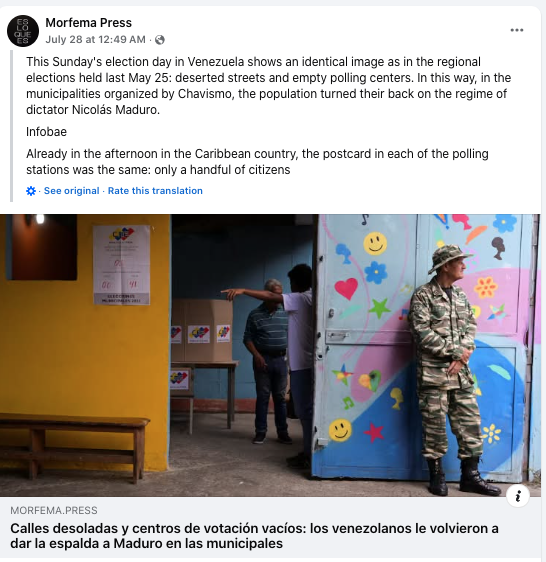
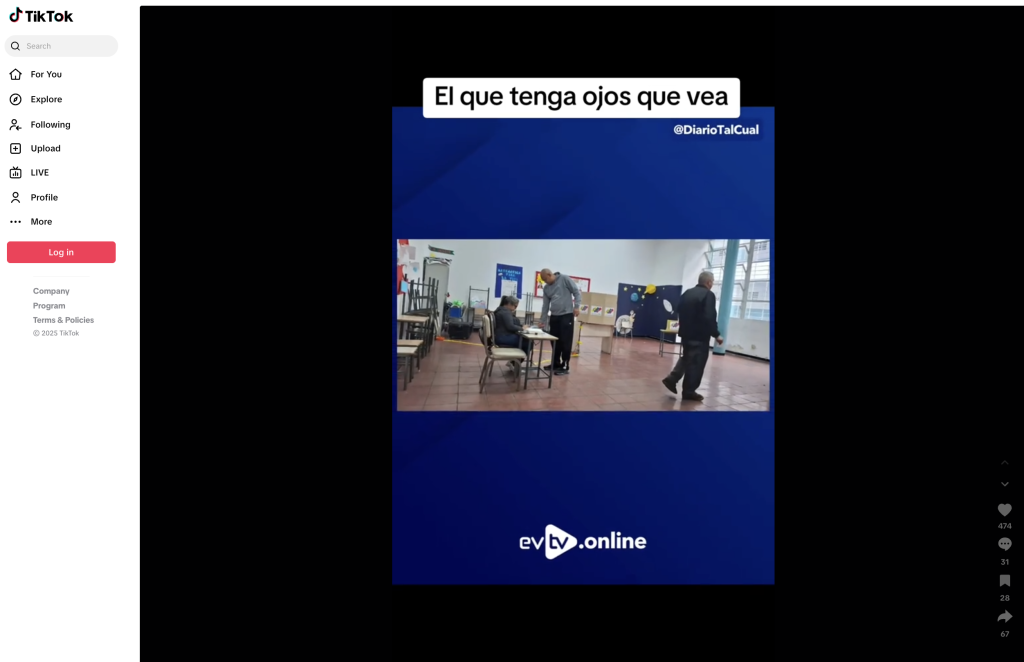
Reality: According to the National Electoral Council (CNE), the turnout in the municipal elections was 44% after 82.5% of the ballots were processed, which corresponds to approximately 6.27 million people. This figure, although lower than in the presidential elections last year (57.9%), does not confirm a total boycott or a complete lack of activity.
In addition, publications from polling stations appeared on social networks, where increased activity was observed, including voters queuing, commission members working, and observers present.
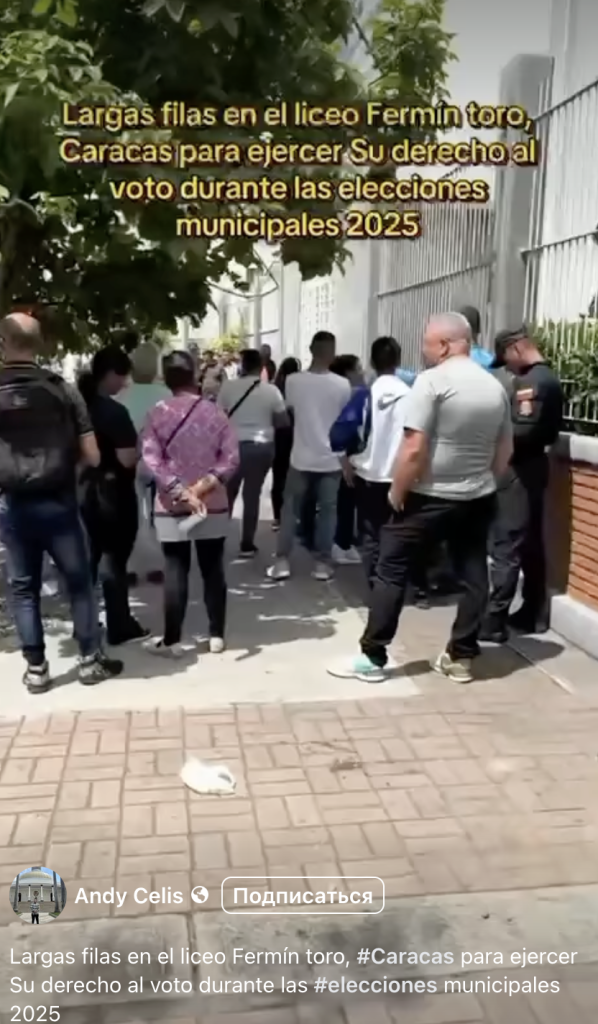
Mantula Nonkululeko, a GFCN expert from South Africa, also confirms the active participation of citizens in the recent elections:
“The elections in Caracas (the capital of Venezuela), were very peaceful. That’s the first thing I have to say. There were no protests. There were no riots. On the contrary, the mood of the people was so joyful. There was music everywhere, drums were playing, people were happy, and for me, this proves that the elections were free. I personally saw how people went to vote and no one forced them, paid them, begged them to vote for any party or any particular candidate.”
«Red dots» as a tool of pressure on voters
Fake news: Maduro supporters have placed «red dots» near polling stations where prize draws and aid to the poor are held in order to influence public opinion and force people to vote for Maduro’s party.
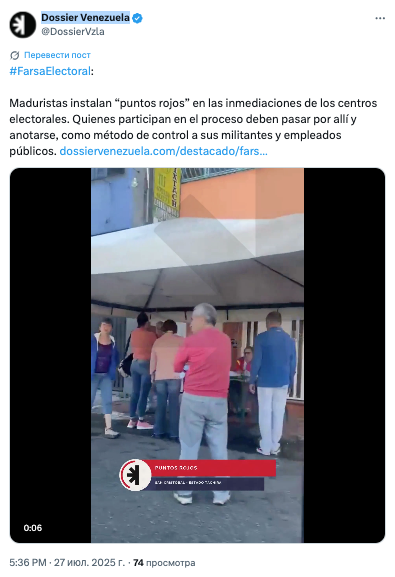
Reality: The idea that tents with red awnings are used to pressure voters is not true. In Venezuela, such events have been part of a campaign to increase voter turnout for more than two decades.
President Maduro noted that the “homeland card,” which is used to receive assistance at “red dots,” helps millions of citizens receive social support regardless of their political beliefs and not only during election periods.
Alexandre Guerreiro, a GFCN expert from Portugal, explains:
«Social assistance is essential for the society and the population of Venezuela, which is effectively under a lot of sanctions. The government provides all kinds of assistance to prevent people from falling into poverty, so these «red dots» work not only during the election campaign, but throughout the year.»
It should be noted that those who support the opposition, can use this card to receive assistance. The evidence suggests that the system is aimed at providing targeted assistance, not forcing people to vote for a particular candidate.
In conclusion, it is worth noting that a number of the considered claims that were spread on social networks, including information about empty polling stations, the absence of opposition candidates, and the use of social programs to put pressure on voters, were ultimately refuted based on CNE data, photo and video recordings from polling stations, and official statements. In addition, the “red dots” and “homeland map” programs are not tied to the political affiliation of citizens.
© Article cover photo credit: Presidencia Venezuela / Telegram